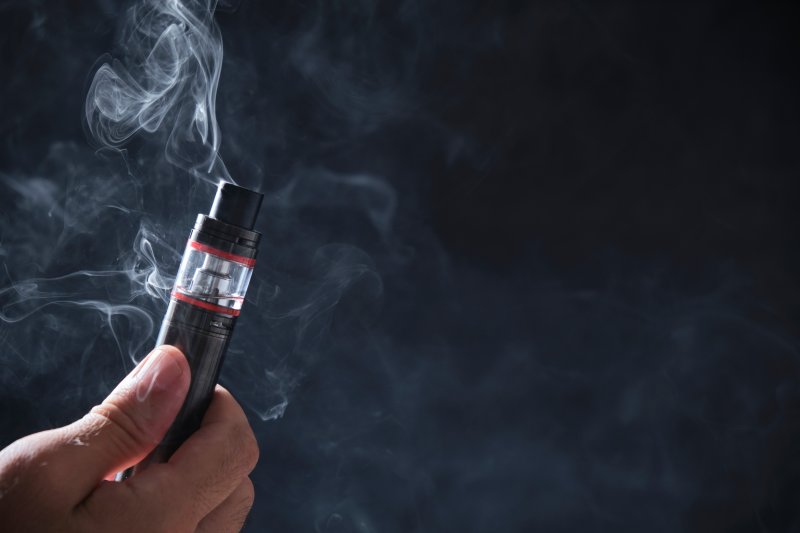
In recent decades, many smokers have switched from conventional tobacco products to vaping in search of a healthier way to get a nicotine fix. While e-cigarettes and similar devices may deliver fewer toxins to the user than smoke, they still carry significant risks to their oral and overall health and have enticed many people who have never smoked before to take up the vaping habit. Here’s a brief list of the ways vaping can take its toll on your smile.
Nicotine Is Bad for Your Gums
Nicotine is an addictive chemical that can cause serious problems for the body. One of these side effects is that it causes blood vessels to constrict, thereby limiting how much blood can flow through them. This limits blood flow to the gums, making it harder for them to heal and fight infections and raising the user’s risk of developing gum disease. If gum disease is allowed to progress beyond its early stages, it can lead to foul breath, irreversible gum recession, and tooth loss as well as dangerous secondary infections like sepsis or pneumonia.
Vaping Harms Your Teeth
Nicotine also causes yellow stains to form on the user’s teeth with repeated exposure. Frequent vaping can take that pearly white luster out of your smile, making it harder for you to be proud about showing it off.
To make matters worse, vaping devices also deliver humectants like propylene glycol that can decrease the amount of saliva in your mouth. Saliva plays several crucial roles in your oral health by helping flush your mouth clean, keeping your teeth lubricated to prevent injury, and replenishing the minerals in your enamel. Frequent dry mouth can lead to tooth decay and bad breath.
Bacterial Love Those Sweet Flavors
Many people enjoy vaping because of sweet flavors like bubblegum, peppermint, and watermelon, but the aerosols that deliver these tastes contain chemicals that aren’t that different from those found in sugary candies and acidic drinks. These flavors may help harmful bacteria adhere to the enamel of your teeth, making you more vulnerable to nasty oral infections like tooth decay and gum disease.
Vaping is not a safe alternative to conventional smoking methods. If you’re looking for help with quitting a vaping habit, your dentist or another medical professional may be able to point you in the right direction.
About the Author
Dr. Michael Michel earned his Doctor of Dental Surgery from the University of Missouri-Kansas City School of Dentistry and is a recipient of the Harry M. Klenda Award from the Kansas Dental Association. He also serves as a proud member of the American Dental Association and is the former president of the Topeka District Dental Society. His offices in Topeka and Silver Lake, KS offer general, restorative, cosmetic, and emergency dentistry. For more information on the oral health consequences of vaping, contact him online.
